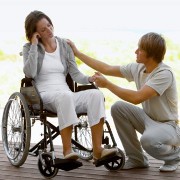Alternative therapies are increasingly being used a treatment option with less side-effects and by people who aren’t content to just manage their condition, but want to live healthily without the use of daily medications.
The top five therapies that people have used to beat their arthritis are:
1. Glucosamine Sulfate and Chondroitin Sulfate Supplements – these are natural substances produced by the body to help maintain healthy connective tissue and joints. Taking an extra quantity of them has been shown in various studies to prevent or lessen arthritis. For instance, a study in BMC Musculoskeletal Disorders found that "Chondroitin sulfate, diacereine, glucosamine sulfate, avocado/soybean unsaponifiables and hyaluronic acid have demonstrated pain reduction and physical function improvement with very low toxicity, with moderate to high quality evidence." Although they looked at osteoarthritis, it is potentially useful for all types of arthritis.
2. Aloe vera juice – Drinking aloe vera juice regularly has been shown to reduce arthritic symptoms. Rubbing aloe vera gel into affected joints can also help. For instance, a study in the Journal of the American Podiatric Medical Association found that topical aloe vera gel reduces inflammation. "Aloe vera preparations were evaluated for topical anti-inflammatory activity using the croton oil-induced edema assay. The results show that small amounts of A. vera given topically will inhibit inflammation induced by a moderate amount of irritant. In general, the decolorized Aloe was more effective than the colorized Aloe (with anthraquinone). A 47.1 percent inhibition of inflammation was obtained by 5 percent decolorized irradiated Aloe. These results may be used as a baseline to assess the biologic activity of A. vera in the treatment of inflammation by podiatric physicians."
3. Omega 3 – Omega 3 in the diet has been shown by numerous studies to reduce arthritic symptoms. A study in Arthritis and Rheumatism showed that regular, long-term intake of omega 3 improved the patients' arthritis. They were divided into three groups. The placebo group took olive oil capsules, the second group took one half olive oil and one half fish oil capsules and the third group took all fish oil capsules. Fifty three percent of people in the all fish oil group had significantly reduced pain and were able to reduce the amount of arthritis medications they were taking, compared with only 10 percent in the olive oil group.
4. Do Yoga! Research has shown that people who participate regularly in yoga exercises have less arthritic symptoms than those who don’t. A study presented at the American College of Rheumatology involved 30 sufferers. Fifteen were placed on a waiting list and the other 15 had two one-hour sessions of yoga a week and were also instructed to practice at home. Those in the yoga group had less sore joints and their swelling reduced. Those on the waiting list experienced no change.
5. Get plenty of sunshine and take a vitamin D supplement – research has shown that women with low levels of vitamin D were more likely to suffer from rheumatoid arthritis, so making sure your levels are adequate may actually prevent arthritis.
Sources: Geusens, Piet, et al. Long-term effect of omega-3 fatty acid supplementation in active rheumatoid arthritis. Arthritis & Rheumatism, Vol. 37, June 1994, pp. 824-29
BMC Musculoskeletal Disorders 2008, 9:165doi:10.1186/1471-2474-9-165
Journal of the American Podiatric Medical Association, Vol 79, Issue 8 395-397
Haaz S, et al. The effect of yoga on clinical parameters in patients with rheumatoid arthritis. Abstract presented at American College of Rheumatology Annual Scientific Meeting. San Francisco, October 25-29, 2008.
http://www.webmd.com/rheumatoid-arthritis/news/20040109/vitamin-d-may-prevent-arthritis
Joanna is a freelance health writer for The Mother magazine and Suite 101 with a column on infertility, http://infertility.suite101.com/. She is author of the book, 'Breast Milk: A Natural Immunisation,' and co-author of an educational resource on disabled parenting, in addition to running a charity for people damaged by vaccines or medical mistakes.






Add a Comment1 Comments
What the link between low vitamin D and arthritis is has never been established. While many studies hypothesise that the low level of vitamin D in most arthritis is somehow the CAUSE of arthritis, there are also dissenting professional opinions that arthritis disease somehow uses up the vitamin D and that is why arthritics are low on it. The second hypothesis has no lobby group promoting it, unlike the first, and therefore doesn't get much press attention. If the second hypothesis is correct, getting MORE vitamin D is actually harmful in the long run.
Some people with RA take massive amounts of vitamin D supplementation, without any measurable improvement in their condition, and still have low vitamin D! What could account for such a phenomenon?
Just because people in colder climates tend to get autoimmune diseases, such as RA, does not establish a direct cause and effect in the case of low vitamin D and RA. People in warmer climates also have many more intestinal parasites, and there is emerging data that some parasites actually halt and reverse certain autoimmune diseases. For example, hookworms and celiac disease, or hookworms and asthma (seriously----look it up!)
It's possible that by jumping on the Vitamin D bandwagon without due diligence in investigating how accurate this current "truth" is, you are actually doing a disservice to those who are seeking natural ways to improve their arthritic condition. I hope RA sufferers will investigate the long standing debate over the helpfulness, or harm, of vitamin D supplementation before adding it to their arsenal of "arthritis fighters".
May 3, 2010 - 12:58pmThis Comment